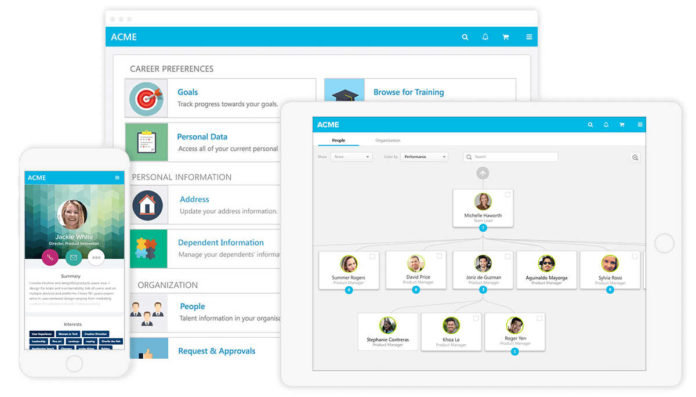
Mark:
Welcome to PeopleTech, the podcast of the HCM Technology Report. I’m Mark Feffer. Today I’m joined by Heidi Spirgi, the chief strategy and growth officer at Cornerstone OnDemand. Heidi has a wide portfolio from leading strategic initiatives to Cornerstone’s content business. We’ll talk about Cornerstone’s acquisition by Clearlake Capital, the pandemic’s impact on the company’s approach, and its commitment to content all on this edition of PeopleTech.
Mark:
Heidi, it’s nice to see you. Thanks for being here. Let’s start by talking about your acquisition this summer. Clearlake Capital, obviously a big firm bringing a lot of money into Cornerstone’s life. How’s it impacted your work?
Heidi:
Yeah, that’s an excellent question. And it’s pretty early to give a very detailed answer to that. We closed the transaction about a week and a half ago from the time of this recording. And so we’re in the very early days of it. That being said, what we do know is that Clearlake has acquired Cornerstone very specifically to help accelerate our growth. They see us as a high growth platform, as an opportunity to really expand the offerings into our existing customer base, expand our customer base, and a lot of that through potential acquisitions as well as inorganic growth.
Heidi:
So in my role as chief strategy and growth officer and being responsible for the fastest growing part of the business, that’s our content business today, I’m really, really excited about it. I think it holds a lot of promise, but to be candid with you early stages and it’s hard to give you any specifics at this point other than we know that they are taking an aggressive growth strategy. So I think you can expect to see some interesting moves from us in the coming couple of years.
Mark:
Okay. And on top of that, we’re sort of getting ready for the new year, for 2022. 2020 and 2021 were obviously unusual years. What did you learn from them and how will it impact your vision going forward?
Heidi:
Another brilliant question. So I learned so much in the last two years. And I think where I’ll start with is I’ve always been what I call a human-centered leader. And I think people used to call that a servant leader. That’s not really, I think, a palatable term in today’s world. So I call it human-centered leadership. And I really have always historically tried to put my people first before everything. And that means bringing your full heart to work and that means cultivating an environment where people really have a high sense of trust, a high sense that they can and belief that they can be their authentic selves and bring their full self to work and not have to check part of their life or their world or their hearts at the door. And that’s something that I have long held and has been core to my leadership style.
Heidi:
And I think in the last 24 months, we’ve seen that play out in spades around the world as companies have shifted their approach to managing and leading people and engaging people, really trying to develop much more of a human-centered approach to leadership at the company level. And that means all kinds of things. There’s been so much focus and attention on now the employee experience and serving our employees and how do we capitalize on their unique strengths and how do we ensure that we’re building an inclusive environment and that we’re continuously helping the employees grow and develop not only based on of course what the business needs, but also based on their own unique career aspirations and career paths.
Heidi:
So a lot of, I think, acceleration has occurred over the last 24 months. So what I’ve learned from that is that the mission at Cornerstone and my personal mission in my career I think has never been more important and companies have never needed it more, which is how do you help companies create an environment where people can thrive, people can grow, people can really feel connected to the purpose and the mission of the business and they feel like they are growing as human beings and they’re becoming the best versions of themselves at work and not just put into a box with a job code and a set of expectations and posts on them pretending that they should operate and function the same way that their peer is in the same role. So I think a lot of good has come from it that really I think it further lights my passion for this next stage at Cornerstone and my own career.
Mark:
Now, a lot of the changes you’re describing took place in real time to a certain degree over the last 18 to 24 months. Did that mean that you folks had to change your roadmap plans or change emphasis from one set of services to another to keep up with the new landscape?
Heidi:
So interestingly, no. And the reason for that is that I came to Cornerstone just about two and a half years ago. Adam Miller, the former CEO and founder of Cornerstone, brought me in really with the mission to help Cornerstone pivot from a talent management company to a talent experience company and really starting to make this transition from our primary value center being the HR function to the primary value center being the employee. And so we’ve been on that path now for about two and a half years. So it preceded the pandemic and the Black Lives Matter movement. So we started that path about two and a half years ago.
Heidi:
And we’re not the only ones. There’s been a recognition amongst CHROs around the world that we need a more human-centered approach to managing people. People skills scarcity has a challenge now for five plus years and on top on the agenda for HR leaders for about three years now. And so a lot of this I would say preceded the last 18 to 24 months. And we were on that path from a product roadmap perspective, but the acceleration as well as amplification of the need has what I would say shifted. So our product strategy hasn’t shifted, but the demand in the market has, if that makes sense.
Mark:
Okay. Now let me shift gears a little bit. One of the things that strikes me about Cornerstone is you’re exceptionally committed to content. You use it almost as a part of your product it seems sometime. Can you explain the thinking behind that and has it worked?
Heidi:
Yeah, absolutely. So the thinking behind it is, and the way that I… I’m going to kind of dumb it down. I’ve always believed that technology in the absence of the content, the data, the information you put inside it is dumb. It doesn’t really deliver impact and value. If you think about the fastest growing companies in the world, they are a fusion of technology and content. So if you think about Google, you think about Facebook, you think about LinkedIn, people don’t think about them as necessarily tech companies. They think about them as the capability, the outcome, the value to the user of that software. That’s what’s driving the value.
Heidi:
And in the case of if the end goal, and this is core to our mission and focus at Cornerstone is to help people grow and develop at work. In order to do that, software alone cannot do it. And there’s so many examples where we see when you own the content and the software and you have that deep fusion between content and software, you can do more with it. You can create magic. And so that’s the premise, which is if you can control the content and the software, the learning content and the software, you create more meaningful, more hyper-personalized learning experiences for people at work.
Heidi:
So that’s the premise. And what I can tell you it is absolutely working. It is the fastest growing part of our business. We see tremendous opportunity. And if you look at the content industry overall, it’s growing by leaps and bounds, whether that is [inaudible] or Coursera or Skillsoft or LinkedIn Learning or Pluralsight, all of those companies are seeing really, really significant growth rates. So it’s a high growth area because companies are really prioritizing not just “training” people, but creating multimodality resources.
Heidi:
And I use resources on purpose because it’s inclusive of things like audio books and podcasts and PDFs and infographics. It’s all kinds of resources to support both perform and support in the moment, as well as longer term growth strategies, a longer term skill building that might be multi-month, multi-year development paths. So companies are looking for really sort of robust and broad and modern set of resources. Let’s face it. Employees also have a very high expectation today of what quality content looks like. The world has become a content first company. We’ve got people in their teens who are multimillionaires because they’re content producers on the internet, on YouTube.
Heidi:
And so we have a very high expectation of quality of content and that needs to be engaging, it needs to be impactful, it needs to be delivered in a format that I prefer that works for my preference, whether that be a video or something written or audio based. So it’s really, I think, the fuel for skill development and companies are struggling to meet the need for that fuel. So they’re turning to these content libraries that are, I think each of us have our own unique point of view and differentiation in the market, but we’re all growing quite quickly.
Mark:
And Heidi, my last question is Cornerstone Convergence is coming up in about three weeks or so. Is there anything in particular that you’re really looking forward to, or can you give us a preview?
Heidi:
Gosh, the thing I’m probably most looking forward to is we do have a keynote. We have an amazing keynote speaker with Malala coming in. So I’m really excited about that. I think the timing is beautiful to help promote Malala’s voice in the market and get her personal experiences in front of our customers. So I always view Convergence as an opportunity to both educate, but also to inspire our customers. And so that’s probably the thing I’m most looking forward to.
Heidi:
Content will be more prominently featured at Convergence this year. And we will also just before Convergence, we will have launched a new platform, which I’m very excited about called Cornerstone Explorer. And there’ll be a lot of sessions on Cornerstone Explorer. So really excited to see the interaction with our customers. Last year, our chat feature was extremely lively and then the Q&A following all the sessions were terrific. So excited to get that early feedback on Explorer from the customer base.
Mark:
Well, Heidi, thanks very much for being with me today.
Heidi:
Well, thank you Mark. It was a pleasure. Thanks for having me.
Mark:
My guest today has been Heidi Spirgi, the chief strategy and growth officer of Cornerstone OnDemand. And this has been PeopleTech, the podcast of the HCM Technology Report. We’re a publication of recruiting daily. We’re also a part of Evergreen Podcasts. To see all of their programs, visit www.evergreenpodcasts.com. And to keep up with HR technology, visit the HCM Technology Report every day. We’re the most trusted source of news in the HR tech industry. Find us at www.hcmtechnologyreport.com. I’m Mark Feffer.














